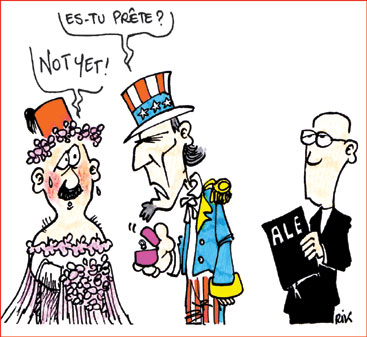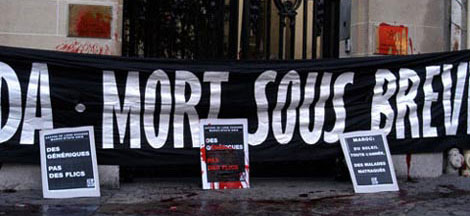Morocco’s FTA fever
All the versions of this article: [English] [Español] [français]
Morocco’s FTA fever
GRAIN
September 2007
In early 2003, the Bush administration, on the verge of unleashing its war on Iraq, proposed a bilateral free trade agreement to the kingdom of Morocco. Talks formally started in early 2003 and ended about a year later. In July 2004, the text was approved by the US Congress. In January 2005, it was approved by Morocco’s parliament. Despite the US and Moroccan governments having opposing views on whether the FTA applies to Western Sahara, it came into force on 1 January 2006. [1]
The US-Morocco FTA has been controversial and important for several reasons.
First, despite its name, the whole initiative has little to do with trade. The main US objective was political: to pull a friendly North African kingdom deeper into its “sphere of influence” and thus create a wedge vis-à-vis the Arab world. The Morocco deal was proudly advertised by Washington as its second FTA with a Muslim nation and a major step towards a full-scale Middle East Free Trade Agreement (MEFTA), to be achieved by 2013. Any such regional deal would pull together all the major strands of US policy in the Middle East. It would “democratise” governance of Arab countries, open them up to US penetration and eventually neutralise all aggression toward Israel. As the US Administration’s 9/11 Commission framed it, what better way to fight “terrorism” - which it insidiously links to Islam - than to push economic and political reform through FTAs. Morocco sells very little to the United States. This FTA was about securing a stronger base for US dominance and control in North Africa.
But North Africa is not just a corner of the Arab world; it is also right across from Europe’s Mediterranean coast. A parallel strategic interest of the US was to position itself better in the region vis-à-vis the European Union. Morocco is a former French colony with strong ties to France. It has special market access to the EU, through a bilateral FTA, that the US doesn’t. French and Spanish transnational corporations are major players there in agribusiness, banking, automobiles and energy. By securing privileged trade and investment conditions through this FTA, the US gained an improved entry point to the EU market as well as an edge against European firms operating across Morocco.

Second, the projected social and economic implications of the deal for Morocco were downright dim. A number of studies showed that the impact of the FTA on Morocco would be marginal at best and detrimental - increased poverty - at worst. [2] A whole range of sensitive issues were on the table: the opening of Morocco’s market to subsidised US wheat, US rules of origin on Morocco’s textile exports, the projected increase in local drug prices and so on. While Moroccan negotiators secured some temporary safety nets on the wheat and garment threats, the underlying message from the merely econometric surveys was that without a significant influx of additional US aid, the kingdom would not be able to fulfil its commitments under the deal without major social setbacks. [3] In sum, the cost-benefit ratio was extremely lopsided. And the economic concerns were not misplaced. Between 2004, when the agreement was signed, and 2006, the last year for which there are complete statistics, the US trade surplus with Morocco passed from a modest US$9 million to US$354 million. [4] That’s an increase of 4,000%. Morocco is simply not making money from this deal.
Third, there was significant opposition to the negotiations at home, which unfortunately a lot of people around the world are not aware of. Various social, political, artistic, farming, scientific and even industrial groups mobilised against a range of problems posed by the FTA. A major issue of debate and mobilisation was access to medicines, jeopardised by the treaty’s extreme intellectual property rules. Another was what the Moroccans called the loss of cultural pluralism: the impending transfer of control over local media and cultural sectors to Walt Disney, Voice of America and CNN. Another more general problem was the government’s flat refusal to heed calls for consultation, debate, questioning, listening and participation - whether it came from the streets (protests by AIDS activists and film producers were violently repressed), the Parliament (opposition parties had to organise their own hearings on the draft treaty with NGOs) or the corporate sector (national pharmaceutical manufacturers were upset that they were excluded from the process). The only people happy about the whole thing, in Morocco, seemed to be a select few in the negotiating team.
|
The fight in Morocco Benzekri Abdelkhalek, Moroccan Association for Human Rights (AMDH), in an interview conducted by Jo Dongwon, MediaCulture Action, in July 2006 People in Morocco have already felt the negative impacts of free trade agreements. How? These agreements push the liberalisation of all services including education, health, transport, water and electricity. That means that all public services which were previously free now have to be paid for. People in Morocco are poor and don’t have the means to pay for these services. What we demand is that these basic services remain free, especially since with these FTAs more and more of them will have to be paid for in the future. People will not be able to pay for them, so people’s needs throughout the country will not be met. We have been leading a campaign in Morocco against these FTAs, which go against the Moroccan people’s interests. Several movements in Morocco have been working together to fight neoliberalism, which the FTAs push. So far, we have managed to stop their implementation. But it’s only a stoppage. Those in power seek other ways to apply this liberalisation policy. We fought first at the national level, within Morocco, and then, with the support of other organisations who share the same ideals, we have been fighting at the international level against this policy. Neoliberalism destroys everything that the people have won and divides society into two classes: a class of super-rich people and a class of extremely poor people. So it’s against neoliberalism, the law of the jungle, that we are in the process of fighting in Morocco. |
Fourth, the US-Morocco FTA ends up breaking Arab unity. The Moroccan government has been a keen player in numerous processes to develop cohesion and solidarity among Arab states. This includes a number of projects to achieve political and economic integration, including a still far-off free trade zone among members of the Arab League. One very concrete step towards this integration was supposed to be the setting up of an initial free trade area between Morocco, Tunisia, Egypt and Jordan. The Agadir Agreement is an FTA between the four countries. It took years to finalise, and once signed, it took still more years to come to life. When the Agreement - which lowers tariffs among the four states as a tool to stimulate trade between them instead of relying on the EU or the US - came into force, Moroccan customs officials couldn’t implement it. Why? Because they had a copy of the US-Morocco FTA, which Rabat had signed a few years earlier, and they knew what it said. Washington had inserted a clause in its FTA which prevents Morocco from trading agricultural goods at preferential tariff rates with any third party that is not a “net exporter” of those goods (meaning it sells more than it buys). [5] This effectively bars Morocco from buying major foodstuffs, such as couscous, from its Agadir partners at the cheap rate Morocco committed itself to. Which means there is little benefit for them at all, thereby gutting the Agadir Agreement and this long-awaited step towards an integrated Arab market.

The Moroccan government, nevertheless, is bullish about FTAs. Not satisfied with playing into the hands of US and European “benefactors” - Arizona investors who come to build five-star playgrounds for foreign tourists, and development cooperation bureaucrats with fat chequebooks that lead to next year’s defence contracts - Rabat struts its stuff around the African continent. [6] Moroccan operators are moving strategically into the banking and telecommunication sectors in Senegal, and the kingdom has formally proposed an FTA with the West African Economic and Monetary Union (WAEMU), a group of nine French-speaking West African states. Morocco took the lead in trying to get the Agadir Agreement up and running, and hosts the Arab Maghreb Union (AMU), formed by Algeria, Libya, Mauritania, Morocco and Tunisia, which aims to have its own FTA as well as one with WAEMU and the Southern Africa Customs Union. And while the AMU has been called “a paper camel”, because it doesn’t get anywhere for political reasons, the CEOs of the five countries have just formed the Arab Union of Employers to push that FTA project along. [7] Even without an AMU deal, Morocco is pushing Mauritania and others for a bilateral one.
If the neoliberal reforms channelled through the US and EU FTAs are pushed through - and that is largely a question of finding the money to pay for them - and if more foreign capitalists take control of the increasingly privatised Moroccan economy, these groups will ultimately be the ones penetrating other parts of Africa through Morocco’s FTA zeal. Who, though, will cover for the social impacts back home?
Footnotes:
[1] The Moroccan government considers Western Sahara as part of Morocco’s sovereign territory. The US government does not.
[2] See, for instance, Ahmed Galal and Robert Lawrence, “Egypt-US and Morocco-US Free Trade Agreements”, Working Paper No. 87, Egyptian Centre for Economic Studies, Cairo, July 2003, http://www.cgdev.org/doc/event%20docs/10.23.03%20GDN%20Conf/galal%20-%20Egypt-US%20and%20Morocco-US%20Free%20Trade%20Agreements.pdf, and Nathan Associates Inc, “Assessment of Morocco’s Technical Assistance Needs in Negotiating and Implementing a Free Trade Agreement with the United States”, Arlington, 2003, http://www.nathaninc.com/NATHAN/files/ccPageContentdocfilename140890705546Morocco_English_(dst).pdf
[3] And this at a time when Morocco’s repayments on US financial assistance exceed its receipts. (See Galal and Lawrence, op cit, p. 21.)
[4] In 2007, it will exceed US$460 million, the level reached as of September for goods alone. (See the US International Trade Commission’s Trade DataWeb at http://dataweb.usitc.gov.)
[5] Saâd Benmansour, “Télescopages entre les accords de libre-échange du Maroc”, La Vie Eco, 10 avril 2007, http://www.yabiladi.com/article-economie-1100.html
[6] “L’ALE Maroc-USA: Un premier investissement”, L’Economiste, Morocco, 9 November 2006, http://www.leconomiste.com/article.html?a=74127
[7] “Les patrons du Maghreb créent leur union”, L’Economiste, Morocco, 19 February 2007, http://www.kompass.ma/actualite/detail.php?ida=10665&url=http://www.kompass.ma/&menu=1&src=eco&niveau=1





